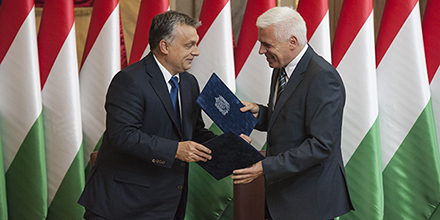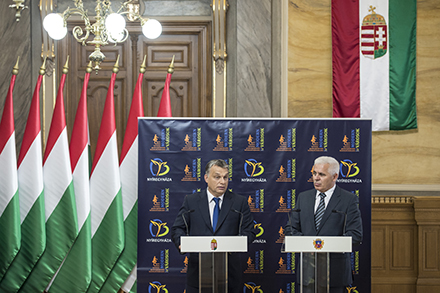
Nyíregyháza may grow to become one of the country’s economic centres
10 November 2015
With the aid of the development funds provided by the Government, Nyíregyháza may grow to become one of the country’s economic centres by 2020, Prime Minister Viktor Orbán stated in Nyíregyháza at his press conference held jointly with Mayor Ferenc Kovács.
After signing a cooperation agreement with Mr Kovács as part of the Modern Cities Programme, the Prime Minister said: the city may become a power hub which will be responsible for a perceivable, significant share of the growth of the Hungarian economy in the next few decades.
From among the details of the agreement, Mr Orbán made specific mention of the refurbishment of the Kállay Mansion which will be completed by 31 October 2016. The Prime Minister further informed the press that a new 320-hectare industrial park will be created, the western bypass roads will be connected together as part of a project worth HUF 18 billion, and there will be a bicycle path between Nyíregyháza and Tokaj by 15 December 2016.
The Prime Minister further informed the press that the Government will support the reconstruction of three urban traffic junctions, the procurement of new buses and the construction of a four-star hotel with 200 beds in Sóstó, and he also spoke about the construction of an athletics centre.

At the press conference held in the Bessenyei Hall of the Town Hall, Mr Orbán stressed in connection with the agreement that the Government will provide development funds for Nyíregyháza, and the city will in return pledge to use these funds well, for the purposes of developments. “The era has definitively come to an end when compassion was the chief sensation we felt whenever we thought of Nyíregyháza; we have now entered a new era when a touch of envy, a great deal of appreciation and the desire to belong here are the chief feelings with associate with this city”, he said.
The Prime Minister mentioned that the Hungarian economy is at present growing by two to three per cent annually; however, in order to reach the goals we have set for ourselves, we should achieve double this growth figure. As he said, to this end we shall need successful cities, as progress on such a scale cannot be achieved without these localities. The bulk of the country’s economic performance originates from cities; they account for the most measurable, most dominant share of the economy, he added.
Hungary’s economic performance today permits and enables the signing of agreements worth tens of billions of forints, Mr Orbán pointed out in reference to the Modern Cities Programme. He reiterated: in 2010 the country was on the verge of bankruptcy, and businesses were not growing. Nyíregyháza, for instance, was a city struggling with a debt of HUF 19 billion and a higher than average unemployment rate five years ago.
We have in the interim become a country performing well in excess of the EU average, and the results are also tangible in Nyíregyháza now: there are more than four million people in employment in the country, the Government has assumed the debts of municipalities, has reduced household utility bills, has – at the expense of enormous efforts – relieved half the country of foreign currency debts, and has “tidied up” Hungary’s EU grants system.
The city has been awarded grants worth HUF 178 billion, of which HUF 170 billion has already been made available. The companies which have relocated to Nyíregyháza have created some 12,000 jobs in total since 2010, the Prime Minister listed the achievements. He added that the municipality has provided jobs for another three thousand people under the auspices of the public works scheme, and as a result, unemployment has decreased from over 8 per cent in 2010 to 5.5 per cent.

Regarding the developments of the next few years, Mr Orbán said that Nyíregyháza will be one of the winners of the projects to be launched. As part of this, the Kállay Mansion located in the centre of the city will be refurbished by the autumn of 2016, a new, 320-hectare industrial park – comprised mainly of state-owned land – will be created, the construction of the western bypass road all the way to Sóstó will be completed as part of a project worth HUF 18 billion, and a 30-kilometre-long bicycle path will be built between Tokaj and Nyíregyháza. An agreement was reached on the reconstruction of the three largest traffic junctions in the city, the procurement of 41 urban electric buses, the construction of a four-star hotel with 200 beds in Sóstó, and the refurbishment of the Sóstógyógyfürdő museum village from an allocation of HUF 1.5 billion.
The NYVSC grounds will be converted into an athletics centre which will cost HUF 2.5-3 billion, the Prime Minister said. Mr Orbán remarked that while this may appear to be a lot of money, the fact that the city has built twelve street workout parks and eleven kindergarten football pitches from its own resources clearly testifies to the fact that there is demand for this in Nyíregyháza.
If the local football club, which is currently in Division III, advances to Division II, “we are ready to seriously talk about the future of the football ground”, but there are conditions tied to this, he said.
Mr Orbán took the view that the refurbishment of the outdoor theatre was “a reasonable proposal”; the Government supports the entire renovation and modernisation programme in theory by allocating some one billion forints to the city for the purpose.
The Prime Minister said in the context of the Digital Hungary Programme that as a result of a development extending to 2018, broadband Internet will be accessible throughout Hungary, and the construction of the network began in Nyíregyháza within the framework of a pilot project.
Mayor Ferenc Kovács told the press that complex and comprehensive developments will be launched in the city in the Nyírség Region which are adjusted to the locality’s needs. The government-party city leader stressed that the road developments will have a major impact on the reduction of transit traffic and tourism in Sóstó, while the new industrial park will boost economic growth and job creation.
MTI, Photos: Károly Árvai



